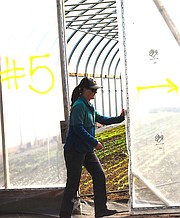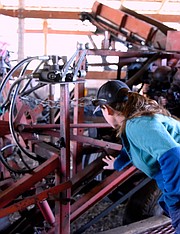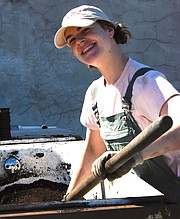Arlee farm offers rainbow of fruits and vegetables
Spring is a time when thoughts turn to gardening, to calling the neighbor to rototill your garden, and deciding whether to plant Early Girl or heirloom tomatoes.
On Harlequin Organic Produce’s 20-acres near Arlee, farmers Kaly Hess and Brian Wirak are months ahead of the home gardeners. They have had planting on their minds all winter long, ordering seeds, planning fields, and tuning up all the tractors and greasing machinery.
According to their website, www.harlequinorganicproduce.com, the name of their farm was chosen because, “like a harlequin cloak our fields are checkered with a rainbow of fruits and vegetables.”
In 2009 the couple came to Arlee, lured by an opportunity to lease Common Ground Farm near Arlee, and Harlequin Organic Produce took root and has been producing since then.
With a 20-acre piece of land, that’s a lot of vitamin-packed vegetables. Their wholesale and grocery store produce is picked up and delivered by the Western Montana Growers Cooperative.
Veggie subscriptions
For years they hauled their produce to local farmers markets, but the COVID pandemic ended that venture. In 2020 they began participating more heavily in Community Supported Agriculture, an 18-week subscription for people to receive a weekly box of fresh produce containing whatever is ready in the garden and greenhouse.
Now they supply approximately 500 customers who pick up boxes of garden-raised vegetables. There are two sizes of subscriptions, large and small.
“That’s our COVID silver lining,” Hess said, grinning.
After the season starts, Harlequin packs CSA boxes on Wednesdays. Hess and Wirak hired a consultant three years ago to look at their packing process. The consultant gave them some “immediate suggestions to increase accuracy and flow.”
Customers can tweak the contents of their weekly shipment. If they don’t like onions, for example, clients have four days to go into the Harlequin Organic Produce website and substitute a different vegetable from the week’s menu.
The first four weeks of the CSA season sees salad greens, radishes, and root crops packed in the boxes. In August, there will be corn, tomatoes, and everything else that’s ripening.
There are seven pickup locations set up for 2023, and customers can collect their goodies every Wednesday from June 7-Oct. 4.
To wind up Harlequin Organic Produce’s growing season, they have an end-of-summer warehouse sale in September and an end-of-season-warehouse sale for storage crops, such as potatoes, onions, squash, pumpkins, etc., in October or November.
Learning to be farmers
Both Montana kids, neither Hess nor Wirak, were raised in agriculture, but they “got interested in this type of farming,” according to Hess. And while 2007 “was just a really good time to get into the farming business … We didn’t know what we were getting into.”
Hess attended Montana State University and earned a degree in Agro-Ecology. For hands-on experience, she helped start Towne Harvest Garden at MSU, a five-acre diversified vegetable and educational research farm. The student-run, community-supported agriculture program is much like the University of Montana’s Peace Farm in Missoula.
Wirak attended school for a couple of years and then went right into farming. The couple interned on a farm up the Bitterroot for even more experience.
The season begins
In early April, their high-tunnel unheated greenhouses are packed with edibles — arugula, spicy salad mix, radishes, peppers, onions, tomatoes, and brassicas (cabbage, cauliflower, kale, broccoli, Brussels sprouts). Drip irrigation keeps the veggies happy. Many of these species are transplanted into larger pots before going to grow in the fields. Other vegetables, such as carrots and beets, are planted directly into the fields.
It takes the month of May to move all the seedlings outside, Hess said.
Their mechanical transplanter is pulled by a tractor. Two small water tanks are mounted on the front with wire mesh trays, where the plants ride. In the middle of the machine is a wheel with spikes spaced as far apart as the farmer would like the plants to be. Water drips down from the tanks, the spikes dig a hole in the soil, and the transplanters poke the young plants into the depression.
Harlequin Organic Produce also has a carrot harvester because they harvest 100,000 pounds of carrots per year. Dating from the 1950s or 60s, this Rube Goldberg machine magically plucks the carrots, separates the tops, and sends the orange vegetables up a conveyor belt where they’re plopped into a wagon pulled by another tractor.
“It was operational when we bought it,” Hess said.
They were lucky enough to buy the carrot harvester from a grower going out of business in Bozeman, who apparently bought it from someone who brought it to Montana from Texas.
Hess and Wirak use agro-ecology principles on the farm, which is certified organic. Cover crops, such as winter rye and oats and buckwheat, planted last fall, are tilled back into the soil. Hess said they might use a moldboard plow or a chisel plow depending on how the fields were left the fall before.
To supplement the nitrogen, they use cow manure from a ranch down the road and sometimes purchased fish fertilizer. The couple buy all their seeds since they grow many hybrids, and they want to choose varieties that work with Montana’s short growing season.







